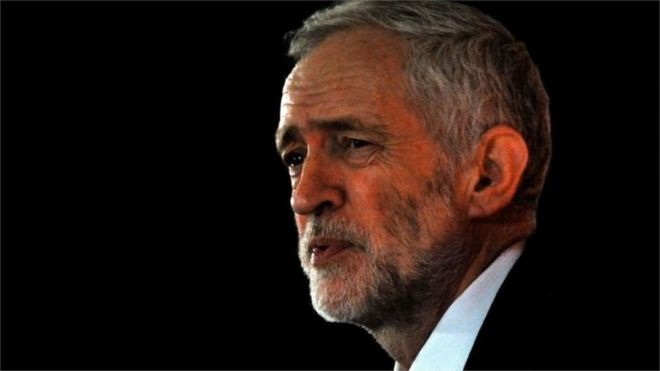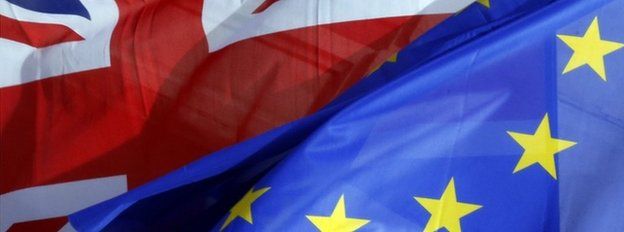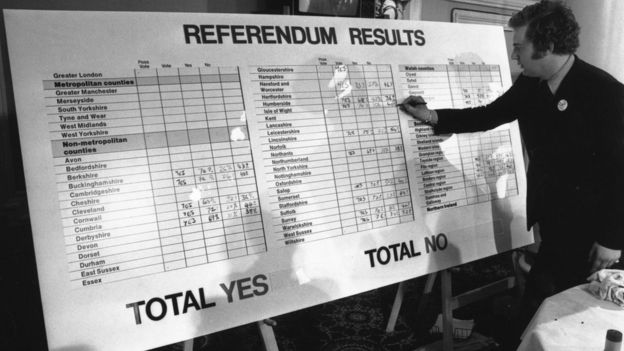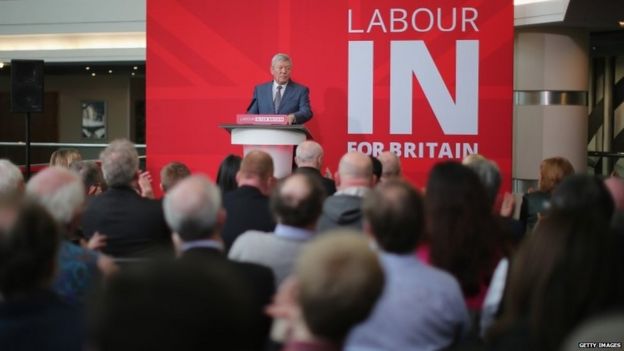 PA
PA
Labour leader Jeremy Corbyn is to set out his case for why Britain should vote to stay in the EU, in his first major intervention in the campaign.
He will emphasise the "socialist case" for remaining in, saying the EU offers workers' rights, as well as consumer and environmental protections.
While he will acknowledge he has been critical of the EU and its "shortcomings", he will argue that reform should be sought from within.
The in-out referendum is on 23 June.
Ahead of the campaign's official beginning on Friday, Vote Leave and Britain Stronger in Europe have been designated as the official Leave and Remain campaigns by the Electoral Commission.
Meanwhile, Leave.EU - a supporter of pro-exit group Grassroots Out which lost out to Vote Leave - will announce by noon on Thursday whether it intends to launch a judicial review of the Commission's decision.
EU referendum: In depth
 Reuters
Reuters
Mr Corbyn has often been critical of the EU and has been urged by many of his MPs to be more vocal in the campaign about the case for membership - but some who want Britain to leave the EU have recently accused him of abandoning his natural euro-scepticism.
In a speech in central London, Mr Corbyn will say the Labour Party is "overwhelmingly for staying in" because it believes it is in the "best interests" of Britons.
The EU, he will say, has created investment and jobs, guaranteed workers' rights, including maternity and paternity leave and paid holiday, and brought benefits for consumers and the environment.
Analysis, BBC political correspondent Ben Wright
The Remain campaign believes mobilising Labour voters behind their cause will be crucial.
Earlier this week the shadow chancellor John McDonnell told the BBC he and Jeremy Corbyn had to do more.
But many Labour MPs worry their leader's enthusiasm for the European Union is tepid, at best.
During the leadership campaign he admitted to "mixed feelings" about the EU and voted against the Lisbon Treaty in 2008.
In a major speech Mr Corbyn will say the Labour party is "overwhelmingly" in favour of staying in, But he is also expected to say he remains critical of its "shortcomings".
Mr Corbyn will also argue the EU offers the "best chance" of meeting the challenges of the 21st Century, such as on climate change, terrorism, the refugee crisis and corporate tax dodging.
"Collective international action through the EU is clearly going to be vital to meeting these challenges. Britain will be stronger if we co-operate with our neighbours in facing them together," he is expected to add.
'Remain and reform'
But Mr Corbyn - who did not rule out backing an EU exit when he was standing for the Labour leadership and who voted to leave the European Economic Community in the 1975 referendum - will say the EU is not perfect, and needs reform.
"Over the years I have continued to be critical of many decisions taken by the EU and I remain critical of its shortcomings - from its lack of democratic accountability to the institutional pressure to deregulate or privatise public services.
"So Europe needs to change. But that change can only come from working with our allies in the EU. It's perfectly possible to be critical and still be convinced we need to remain a member," he will say.
 Getty Images
Getty Images
The Labour leader will set out his vision for "a real social Europe", with more accountability, a strengthening of workers' rights and powers for governments to "support public enterprise and halt the pressure to privatise public services".
He will add: "There is a strong socialist case for staying in the European Union, just as there is also a powerful socialist case for reform and progressive change in Europe."
'Warts and all'
Mr Corbyn will also use his speech to warn against the temptation to "blame the EU, or worse to blame foreigners" for the UK's "problems" - and say it is the government that is "failing" the country.
He is expected to contest leave campaigners' claims the EU is to blame for the UK steel crisis, and accuse ministers of having "failed so comprehensively" to protect the industry.
"It is not the EU that is the problem, but a Conservative government here in Britain that doesn't recognise the strategic importance of steel, for our economy and for the jobs and skills in those communities."
He will say that, unlike the Conservatives, a future Labour government would work with EU allies to "stand up for" British steel, protect human rights, and tackle climate change and tax avoidance.
"You cannot build a better world unless you engage with the world, build allies and deliver change. The EU, warts and all, has proved itself to be a crucial international framework to do that," he will add.
 Getty Images
Getty Images
The majority of Labour's MPs support continued EU membership, with former home secretary Alan Johnson heading up its Labour In campaign.
He told BBC's Breakfast the EU was "not a perfect institution" but it was "best to stay in and reform it, given its crucial importance for security, prosperity and Britain's place in the world".
Asked why the Labour leader's speech was coming so late in the campaign, Mr Johnson said it was part of the media strategy and was not the first time Mr Corbyn had said he was committed to the campaign to stay in the EU.
Mr Johnson also denied being complacent about the referendum, saying it was the "most important political decision of my lifetime".
"This can go in all kinds of directions - this can turn into a referendum on the government's popularity. That's what we've seen in plebiscites elsewhere," he added.
There are some in the Labour party who back the rival leave campaign.
MP Gisela Stuart, who chairs the cross-party Vote Leave group - which also includes London mayor Boris Johnson and Justice Secretary Michael Gove - has said workers' rights have been "hard won" in the UK, not Europe.
She has also warned that the eurozone economies are a "ticking time bomb" that will harm the UK if it stays in the EU.
"If we want to take back control of our economy, our democracy and the £350m we hand to Brussels each week the only safe option is to Vote Leave," she said.
0 Response to "EU referendum: Labour leader Jeremy Corbyn to set out EU case"
Post a Comment